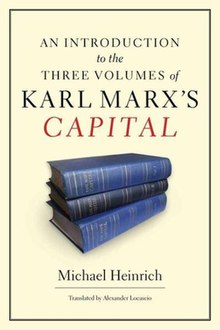
Karl Marx was a German-born philosopher, economist, political theorist, historian, sociologist, journalist, and revolutionary socialist. His best-known works are the 1848 pamphlet The Communist Manifesto and the three-volume Das Kapital (1867–1894); the latter employs his critical approach of historical materialism in an analysis of capitalism and represents his greatest intellectual achievement. Marx's ideas and theories and their subsequent development, collectively known as Marxism, have exerted enormous influence on modern intellectual, economic and political history.

In economics, a commodity is an economic good, usually a resource, that specifically has full or substantial fungibility: that is, the market treats instances of the good as equivalent or nearly so with no regard to who produced them.

In Marxist philosophy, the term commodity fetishism describes the economic relationships of production and exchange as being social relationships that exist among things and not as relationships that exist among people. As a form of reification, commodity fetishism presents economic value as inherent to the commodities, and not as arising from the workforce, from the human relations that produced the commodity, the goods and the services.
Use value or value in use is a concept in classical political economy and Marxist economics. It refers to the tangible features of a commodity which can satisfy some human requirement, want or need, or which serves a useful purpose. In Karl Marx's critique of political economy, any product has a labor-value and a use-value, and if it is traded as a commodity in markets, it additionally has an exchange value, defined as the proportion by which a commodity can be exchanged for other entities, most often expressed as a money-price.
Moishe Postone was a Canadian historian and social theorist. He was a professor of history at the University of Chicago, where he was part of the Committee on Jewish Studies.
Fictitious capital is a concept used by Karl Marx in his critique of political economy. It is introduced in chapter 25 of the third volume of Capital. Fictitious capital contrasts with what Marx calls "real capital", which is capital actually invested in physical means of production and workers, and "money capital", which is actual funds being held. The market value of fictitious capital assets varies according to the expected return or yield of those assets in the future, which Marx felt was only indirectly related to the growth of real production. Effectively, fictitious capital represents "accumulated claims, legal titles, to future production" and more specifically claims to the income generated by that production.

Abstract labour and concrete labour refer to a distinction made by Karl Marx in his critique of political economy. It refers to the difference between human labour in general as economically valuable worktime versus human labour as a particular activity that has a specific useful effect within the (capitalist) mode of production.
The tendency of the rate of profit to fall (TRPF) is a theory in the crisis theory of political economy, according to which the rate of profit—the ratio of the profit to the amount of invested capital—decreases over time. This hypothesis gained additional prominence from its discussion by Karl Marx in Chapter 13 of Capital, Volume III, but economists as diverse as Adam Smith, John Stuart Mill, David Ricardo and William Stanley Jevons referred explicitly to the TRPF as an empirical phenomenon that demanded further theoretical explanation, although they differed on the reasons why the TRPF should necessarily occur.
Helmut Reichelt is a German Marxian critic of political economy, sociologist and philosopher. Reichelt is one of the main authors of the “Neue Marx-Lektüre” and considered to be one of the most important theorists in the field of Marx's theory of value.
In classical political economy and especially Karl Marx's critique of political economy, a commodity is any good or service produced by human labour and offered as a product for general sale on the market. Some other priced goods are also treated as commodities, e.g. human labor-power, works of art and natural resources, even though they may not be produced specifically for the market, or be non-reproducible goods. This problem was extensively debated by Adam Smith, David Ricardo, and Karl Rodbertus-Jagetzow, among others. Value and price are not equivalent terms in economics, and theorising the specific relationship of value to market price has been a challenge for both liberal and Marxist economists.

Capital. A Critique of Political Economy. Volume II: The Process of Circulation of Capital is the second of three volumes of Capital: Critique of Political Economy. It was prepared by Friedrich Engels from notes left by Karl Marx and published in 1885.
Critique of political economy or simply the first critique of economy is a form of social critique that rejects the conventional ways of distributing resources. The critique also rejects what its advocates believe are unrealistic axioms, faulty historical assumptions, and taking conventional economic mechanisms as a given or as transhistorical. The critique asserts the conventional economy is merely one of many types of historically specific ways to distribute resources, which emerged along with modernity.
Neue Marx-Lektüre or NML is a revival and interpretation of Karl Marx's critique of political economy, which originated during the mid-1960s in both Western and Eastern Europe and opposed both Marxist–Leninist and social democratic interpretations of Marx. Neue Marx-Lektüre covers a loose group of authors primarily from German-speaking countries who reject certain historicizing and empiricist interpretations of Marx's analysis of economic forms, many of which are argued to spring from Friedrich Engels role in the early Marxist workers' movement.

Theories of Surplus Value is a draft manuscript written by Karl Marx between January 1862 and July 1863. It is mainly concerned with the Western European theorizing about Mehrwert from about 1750, critically examining the ideas of British, French and German political economists about wealth creation and the profitability of industries. At issue are the source, forms and determinants of the magnitude of surplus-value and Marx tries to explain how after failing to solve basic contradictions in its labour theories of value the classical school of political economy eventually broke up, leaving only "vulgar political economy" which no longer tried to provide a consistent, integral theory of capitalism, but instead offered only an eclectic amalgam of theories which seemed pragmatically useful or which justified the rationality of the market economy.
In Marxist philosophy, reification is the process by which human social relations are perceived as inherent attributes of the people involved in them, or attributes of some product of the relation, such as a traded commodity.

Capital: A Critique of Political Economy, also known as Capital, is a foundational theoretical text in materialist philosophy and critique of political economy written by Karl Marx, published as three volumes in 1867, 1885, and 1894. The culmination of his life's work, the text contains Marx's analysis of capitalism, to which he sought to apply his theory of historical materialism "to lay bare the economic laws of modern society", following from classical political economists such as Adam Smith, Jean-Baptiste Say, David Ricardo and John Stuart Mill. The text's second and third volumes were completed from Marx's notes after his death and published by his colleague Friedrich Engels. Das Kapital is the most cited book in the social sciences published before 1950.
Marxian economics, or the Marxian school of economics, is a heterodox school of political economic thought. Its foundations can be traced back to Karl Marx's critique of political economy. However, unlike critics of political economy, Marxian economists tend to accept the concept of the economy prima facie. Marxian economics comprises several different theories and includes multiple schools of thought, which are sometimes opposed to each other; in many cases Marxian analysis is used to complement, or to supplement, other economic approaches. Because one does not necessarily have to be politically Marxist to be economically Marxian, the two adjectives coexist in usage, rather than being synonymous: They share a semantic field, while also allowing both connotative and denotative differences.

A Contribution to the Critique of Political Economy is a book by Karl Marx, first published in 1859. The book is mainly a critique of political economy achieved by critiquing the writings of the leading theoretical exponents of capitalism at that time: these were the political economists, nowadays often referred to as the classical economists; Adam Smith (1723–90) and David Ricardo (1772–1823) are the foremost representatives of the genre.
There are five main lines of scholarly criticism of Marx's idea of the form of value.

Michael Heinrich is a German historian of philosophy, political scientist, and mathematician, specialising in the critical study of the development of Marx's thought. Heinrich's work, influenced by Elmar Altvater and the Neue Marx-Lektüre of Hans-Georg Backhaus and Helmut Reichelt is characterised by its focus on the points of ambivalence and inconsistency in the work of Marx. Through this theme, Heinrich challenges both the closed system he identifies with "worldview Marxism", as well as teleological narratives of Marx's intellectual development throughout his life. He is best known for his 1991 study of the theoretical field of classical political economy The Science of Value, his introductory text to the critique of political economy An Introduction to the Three Volumes of Karl Marx's Capital, and his ongoing project to produce a multi-volume biography of Marx, of which the first volume of a projected four was published in 2020.










